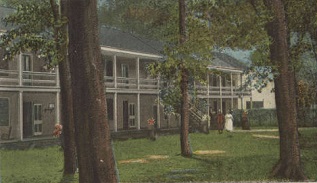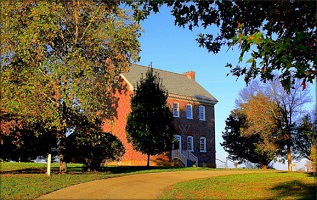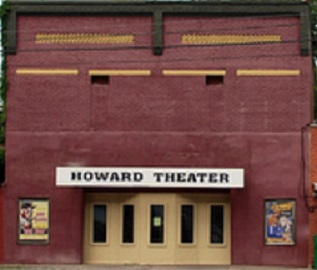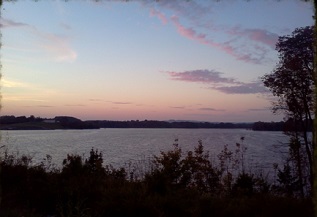 Crab Orchard Kentucky is an eastern Lincoln county town about ten miles southeast of Stanford. It was named for a stand of crab apple trees by Henry Long Hunter Skaggs. Crab Orchard was near the end of the Logan Trace off of Skaggs Trace and was an early pioneer station. There are several mineral springs in the area and from 1827 until 1922 taverns and hotels were located at Crab Orchard Springs. Crab Orchard Springs became noted for its hospitality. During the century from 1830 to 1930, Crab Orchard Springs offered mineral waters and a gala social season to its guests, who often numbered more than 400 each night. Historical Marker #152 in Crab Orchard notes the popular mineral springs resort that operated there for almost one hundred years.
Crab Orchard Kentucky is an eastern Lincoln county town about ten miles southeast of Stanford. It was named for a stand of crab apple trees by Henry Long Hunter Skaggs. Crab Orchard was near the end of the Logan Trace off of Skaggs Trace and was an early pioneer station. There are several mineral springs in the area and from 1827 until 1922 taverns and hotels were located at Crab Orchard Springs. Crab Orchard Springs became noted for its hospitality. During the century from 1830 to 1930, Crab Orchard Springs offered mineral waters and a gala social season to its guests, who often numbered more than 400 each night. Historical Marker #152 in Crab Orchard notes the popular mineral springs resort that operated there for almost one hundred years.
Kentucky, much like its mother-state Virginia, was home to numerous natural mineral springs. And, like Virginians, Kentuckians in the nineteenth century started a cottage industry in spas and resorts located around the springs, which drew people from near and far to bathe in the healing waters and enjoy fashionable society and entertainment.
One noted group of Kentucky mineral springs was located at Crab Orchard in Lincoln County. Crab Orchard took its name from a large crab apple orchard that grew adjacent to this section of the famous Wilderness Road, which ran from Hazel Patch to Logan's Station (also known as St. Asaph, now present day Stanford).
Eight natural mineral springs were located at Crab Orchard. Three of the springs contained iron-heavy water, two produced salt water, and three others provided different types of sulfur water. In 1827, entrepreneur Jack Davis established the first resort, and, by the 1860s, Crab Orchard Springs had developed into one of the most sought after hydrotherapy resorts in Kentucky. Advertisements ran in Kentucky newspapers touting the curative powers of the waters and offering information on stagecoach lines to the springs.
In 1871, a fire destroyed the main hotel building at Crab Orchard Springs, but, under the supervision of the site's owner, Isaac Shelby III, a new hotel was constructed that featured more than 250 rooms. Patrons to Crab Orchard Springs could find all types of entertainment while at the resort. Some guests preferred rougher and unseemly sports like cock fighting and gambling, while others chose more dignified diversions such as horse racing and boating.
Crab Orchard Springs thrived into the late nineteenth century. However, as American society became more independently mobile with the rise of the automobile, people sought out different forms of recreation and entertainment and turned away from the mineral bathing resorts. In 1897, the resort was purchased by Joe Willis, who operated it until 1922. After it closed, the hotel served as a school building. Today, not much remains of Crab Orchard Springs except for the memories and extant images of this once flourishing resort.
William Whitley House
 William Whitley House State Historic Site is one of the first brick house west of the Allegheny Mountains. The estate, named Sportsman's Hill, was home to William and Esther Whitley and had the first circular racetrack to run counter-clockwise in the United States.
William Whitley House State Historic Site is one of the first brick house west of the Allegheny Mountains. The estate, named Sportsman's Hill, was home to William and Esther Whitley and had the first circular racetrack to run counter-clockwise in the United States.
The Whitley family was one of the first families to settle in frontier Kentucky in the 1770s. William Whitley would serve with George Rogers Clark, Captain John Montgomery, and later under Kentucky's first governor, Isaac Shelby, as a major in the 6th Regiment of the Kentucky militia.
Hours of Operation
Grounds open seasonally.
Open for tours April 1 through April 16.
Wednesday through Saturday - 9:00 a.m. to 5:00 p.m., last tour at 4:30 p.m.
CLOSED every Sunday through April 17, Re-opens for Sunday tours on April 24.
For more information, call 606-355-2881.
Howard Theater
 The Howard Theater, Crab Orchard, KY. Built in 1947 the theater looks to have been restored from its outward appearance. It is located in Crab Orchard, KY on KY 39 , the main drag for the town. Many famous entertainers had performed there including Loretta Lynn, the Osborne Brothers, the father of Bluegrass Bill Monroe, Conway Twitty, Homer Harrison and his trained horse, and Jerry Lee Lewis who stated on CMT that it was one of the roughest places he performed. The youngest act to perform in the theater was country singer John Michael Montgomery at the age of 5. He was booked in the theater by his father, Harold Montgomery.
The Howard Theater, Crab Orchard, KY. Built in 1947 the theater looks to have been restored from its outward appearance. It is located in Crab Orchard, KY on KY 39 , the main drag for the town. Many famous entertainers had performed there including Loretta Lynn, the Osborne Brothers, the father of Bluegrass Bill Monroe, Conway Twitty, Homer Harrison and his trained horse, and Jerry Lee Lewis who stated on CMT that it was one of the roughest places he performed. The youngest act to perform in the theater was country singer John Michael Montgomery at the age of 5. He was booked in the theater by his father, Harold Montgomery.
Cedar Creek Lake
 Cedar Creek Lake is a 784-acre reservoir in eastern Lincoln County, Kentucky, USA, between Stanford and Crab Orchard along U.S. Highway 150. Cedar Creek Lake is the second largest state-controlled lake in Kentucky.
Cedar Creek Lake is a 784-acre reservoir in eastern Lincoln County, Kentucky, USA, between Stanford and Crab Orchard along U.S. Highway 150. Cedar Creek Lake is the second largest state-controlled lake in Kentucky.